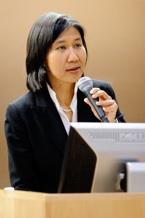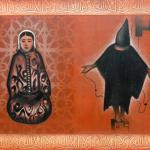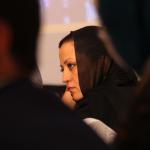Human rights lawyer and Board Chair of Women Living Under Muslim Laws (WLUML) Zarizana Aziz talks with IMOW about the diversity of laws said to have been derived from Islam, challenging laws and customs that govern women's bodies and how WLUML has taken action to support women by breaking their isolation and bringing them together in solidarity.
Samina Ali: First of all, congratulations on all of your success. You are both a practicing lawyer and the board chair of Women Living Under Muslim Laws (WLUML), which is an international solidarity network. Can you tell our viewers the focus and goals of this organization?
Zarizana Aziz: Women Living Under Muslim Laws is an international solidarity network that provides information, support and collective space for women whose lives are shaped, conditioned or governed by laws and customs said to derive from Islam. For more than two decades WLUML has linked individual women and organizations.
What kinds of organizations have you linked women to? How do these organizations help women?
The organizations and individuals WLUML connects women with are those that share our concerns. WLUML has a history of ensuring that we take action in collaboration with local networks so that any action WLUML engages in is in line with and supports the strategies of these networks. WLUML is respectful of the needs and strategies of our local networks and works together with them toward achieving the same goals. Remember, empowered women in each country generally have a vision for their future and have put in a lot of effort toward achieving their vision.
The organization is active in more than 70 countries ranging from South Africa to Uzbekistan, from U.K. to Brazil, Senegal to Indonesia. You work with women living in countries where Islam is the state religion to secularly governed countries. Are there any common themes that women face no matter where they live?
WLUML challenges the myth of one, homogenous “Muslim world.” Women in all of these countries are affected by laws and customs said to have been derived from Islam. Yet these laws said to be Muslim vary from one context to another and the laws that determine our lives are from diverse sources: religious, customary, colonial and secular. Women are governed simultaneously by many different laws: laws recognized by the state (codified and uncodified) and informal laws such as customary practices which vary according to the cultural, social and political context.
Can you give us an example of how a woman might be governed by multiple laws and how this effects her?
Some countries have a plural legal system, that is there exists one law that applies to almost everybody and then a law (normally restricted in application e.g. family laws) that applies only to a particular community. In the US, this might be equivalent to perhaps Native American communities.
In the Muslim context, this normally would be Muslim Family Laws which apply only to Muslims while everyone else may be subject to a general set of family laws. A woman may also be subject to other informal customary laws or norms whether sanctioned by the government or not. This may include tribal councils and religious authorities which may issue pronouncements (also known as “fatwas”). These “laws” would, for example, prohibit marriage between Muslims and persons of other faiths or only allow Muslims to inherit from a Muslim deceased. So a person is affected by these Muslim laws even if she is not a Muslim e.g. a mother cannot inherit from her son if he converted to Islam.
What has been the most challenging aspect of your work?
Struggling for equality and freedom from violence in the face of rising forces that seek to justify discrimination and violence against women in the name of culture and religion.
Can you tell us about what you consider to be one of WLUML’s success stories?
The Women and Law Programme—WLUML undertook a multi-year research project into the Muslim laws as codified or practiced in different Muslim countries. The research indicates that these laws are diverse therefore challenging the myth that Muslim laws (commonly mistakenly referred to as “shariah laws”) are not divine and immutable, but rather are the result of human interpretation and understanding.
Feminist Leadership Institutes—a 12-14 day institute for young (in relation to activism not age) feminists which seeks to equip feminists with knowledge of law (including religious laws), international systems, networking, advocacy, fund-raising.
Our many publications on challenging fundamentalisms—which reinterpret the Qur’an, militarization and its impact on women and bring women’s voices of their many admirable efforts together for equality and against discrimination. WLUML was among the first to identify and work on some of these issues e.g. fundamentalisms.
The organization currently has an exhibition about dress codes, which looks at women’s dress codes in Muslim communities but also presents women’s dress and clothing worn by women from communities other than Muslim. Can you tell us a little about this exhibition and its purpose?
The exhibition seeks to raise awareness and educate on diversity of Muslim culture. We cannot forget that Islam spread so quickly and widely due to its ability to recognize and live with diverse cultures across the globe. In many instances, Islam allows the adoption of local customs (“urf”). For example in Malaysia, our Muslim laws adopt the legal provision recognizing the rights of the non-income earning spouse in the marital assets due to her contribution to the marriage so, Muslim women have a share in the matrimonial assets.
Which laws that are said to be “Muslim” are currently requiring the most urgent action?
There are many. From laws denying women equality (e.g. complementarity of men and women instead of equality), men’s guardianship over women, denying women’s political participation and leadership, denying women’s mobility, family laws and inheritance laws.
What one piece of advice do you have for the next generation of women around the world?
Do not accept that women are born to suffer discrimination, inequality and violence. The more you learn the better you will understand of how culture and religion have been politicized to justify discrimination and silence women’s voices. Culture is dynamic and is influenced by contemporary societal needs and must reflect our understanding of justice and equality.
For example, slavery was the norm and accepted customary practice across many cultures and sanctioned by religious leaders of their times. It is not acceptable and, in fact, is repugnant to us today. Such customary practices are undeserving of preservation and must ultimately give way to justice and education.
Although it’s international now, where did the organization first begin and what inspired that beginning?
WLUML was founded as an international solidarity network. It came about because our founding mothers were convinced they had to do something to address the discrimination and violence suffered by women, that they had to break the isolation and bring women together in solidarity to challenge laws said to have been derived from Islam and the political use of culture and religion. WLUML started without funds, sending out alerts for action on a few women’s savings to pay for postage.
- Log in to post comments




